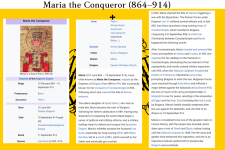[The person in the infobox is a Byzantine empress dowager from the 12th century named Maria of Antioch, whom I was not aware of in August 2023, when I first wrote my TL in the other place]
Maria the Conqueror's date of birth is debated by historians.
Throughout her life, she claimed to have been born on 10 June 864 according to the Julian calendar; however, no birth records were kept in the majority of countries at the time.
While the majority of non-academics believe this was her birth date and it was repeated by the majority of Maria's biographers before the 20th century, a Bulgarian historian who focuses on his country's imperial history believes it to be "based on a fertile imagination" and writes it is safer to say she was born around 865, due to Maria not being the most honest or sincere person, and the fact most people during the Middle Ages did not know when they were born, so Maria, a mere human, would be no exception. On the other hand, some academics accept it in the lack of any contrary evidence.
In any case, Maria was in twenties by the time she ascended the throne. Little is known about her early life other than the fact she received a decent education for the time, and was known since her childhood for being considerably intelligent, at least for women at the time. In 885, Kynaz Boris I named Maria his successor due to not having a male heir (Maria's only sibling was her sister Anna), making it ironic that one of the most important figures in history rose to power through accident.
Maria's government reforms between 889 and 896 included:
- Lower tributes on the peasantry in order to form an alliance of the crown and commons against the noble opposition;
- Meritocracy in the upper echelons of the government and military;
- Persecution of pagans and the defense of Bulgarian interests against the Byzantines;
- Establishing a system of provinces, counties and communes;
- Founding a navy in order to allow Constantinople to be besieged;
- Abolishing the death penalty and torture in most and all cases, respectively;
- Translating Greek and Roman philosophical texts into Bulgarian. (She was deeply interested in history and philosophy, more than acceptable for a woman at the time)
However, this was initially overshadowed by her scandalous love affairs. Sometime in 891, she found a handsome young man – Mihai Gavrilov – hunting near Pilska, and seduced him, as she did to his brother Gavril. Maria and Mihai had a long-term relationship for nine years, and the Empress bore him an unknown amount of children. During this time, she had other affairs, but Gavrilov remained her favorite until she had a change of heart.
The former Kynaz Boris I was furious when he learned his daughter was being unfaithful to his son-in-law, and decided to launch a revolt in order to overthrow her and install her husband on the throne. This plan backfired when Ivan remained loyal to Maria, and the royal couple's rapidly expanding military crushed the rebels, who were subsequently publicly executed in Preslav's town square; a legend states their remains were shown across Maria's realm to dissuade any opponents. Her decision to execute her father is particularly historically controversial.
In 893, Maria claimed the imperial title and was crowned
Tsarina in the new capital of Preslav, automatically triggering the war she had been preparing for years. Bulgarian forces led by Ivan and other generals pushed through the Balkans, eventually crushing Leo VI's infantry and cavalry north of Constantinople, and putting the city under siege, as did her navy. The Bulgarians were armed with equipment like flamethrowers, battering rams and other siege weapons, which allowed her army to climb the Theodosian Walls on 2 September 896; on 17 September, Emperor Leo VI escaped to Asia Minor, and Bulgaria captured the city. The Byzantine senate elected Maria the Roman Empress (Translatio imperii) before being disbanded by her.
Maria and her consort moved to the former imperial palace in Constantinople, while she replaced the patriarch with a former opponent of Leo VI, and later introduced her reform policies to a larger area by unifying weights and measures and reforming the Code of Justinian. This made her popular with the majority of her subjects, except for those who disliked the idea of world conquest and saw it as a deal breaker for women to commit adultery, and her syncretic cultural policies increased this popularity.
She had to pick and choose what to do to crush resistance to her conquest, which endured until 901. Maria allowed members of the former Byzantine government to remain in their original positions as long as they took a loyalty oath, while executing those who opposed it and, according to rumours, using her beauty to seduce some of them.
In 905, Maria, claiming the status of Christians under Abbasid rule as her casus belli, launched a war against the Caliphate. With Egypt having been returned to direct Abbasid rule, the whole fertile crescent was annexed by Bulgaria in 913. This made Maria the most powerful human in the world.
However, her health steadily weakened during the wartime years, due to Maria being overweight and simultaneously travelling thousands of kilometers from Tsargrad (Constantinople) to Baghdad after the Bulgarian victory. She died on September 914.



